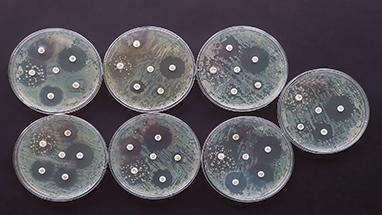Seminario - Biotecnologie e Bioscienze - Giovedì 16 ottobre 2025, ore 16:30, edificio TELLUS-U4, aula U4-04
Jens Hasserodt, Université de Lyon – ENS de Lyon
Abstract

Antimicrobial resistance (AMR) is predicted by the WHO to surpass cancer as the leading cause of death by 2050. Our armamentarium of efficacious (!) antibiotic molecules is shrinking continuously as bacterial pathogens become progressively resistant to them. To slow this development, expert organizations call for improved stewardship measures to preserve humanity’s heritage in antibacterial drugs, i.e. measures that stop their uncontrolled, excessive use that puts unnecessary selection pressure on bacteria. Such measures include informing health professionals much faster on the presence of resistant strains in their patient. This is achieved with modern, rapid in vitro diagnostic tests. We at ENS Lyon have developed a technology of molecular probes that detect specific enzyme activity by generating an intensely fluorescent precipitate. This hitherto unknown performance allows for the design of much faster in vitro diagnostic tests for the presence of antimicrobial resistance. The seminar will address the structure-activity relationship underlying the molecular probes as well as the concrete results they deliver in the development of AMR diagnostic tests.
Ospite: Francesco Peri
Il seminario è APERTO a tutti.
La REGISTRAZIONE ONLINE al seminario è un requisito indispensabile per chi desidera richiedere l’ATTESTATO DI PARTECIPAZIONE, che, insieme alla firma sul FOGLIO PRESENZE, confermerà l’effettiva partecipazione.
La registrazione online al seminario sarà disponibile qualche giorno prima dell'evento.
per informazioni: infobtbs@unimib.it
cerca online: #PeriLab_BtBs , #BtBsSeminar , #BtBsUNIMIB , #BtBsSeminars